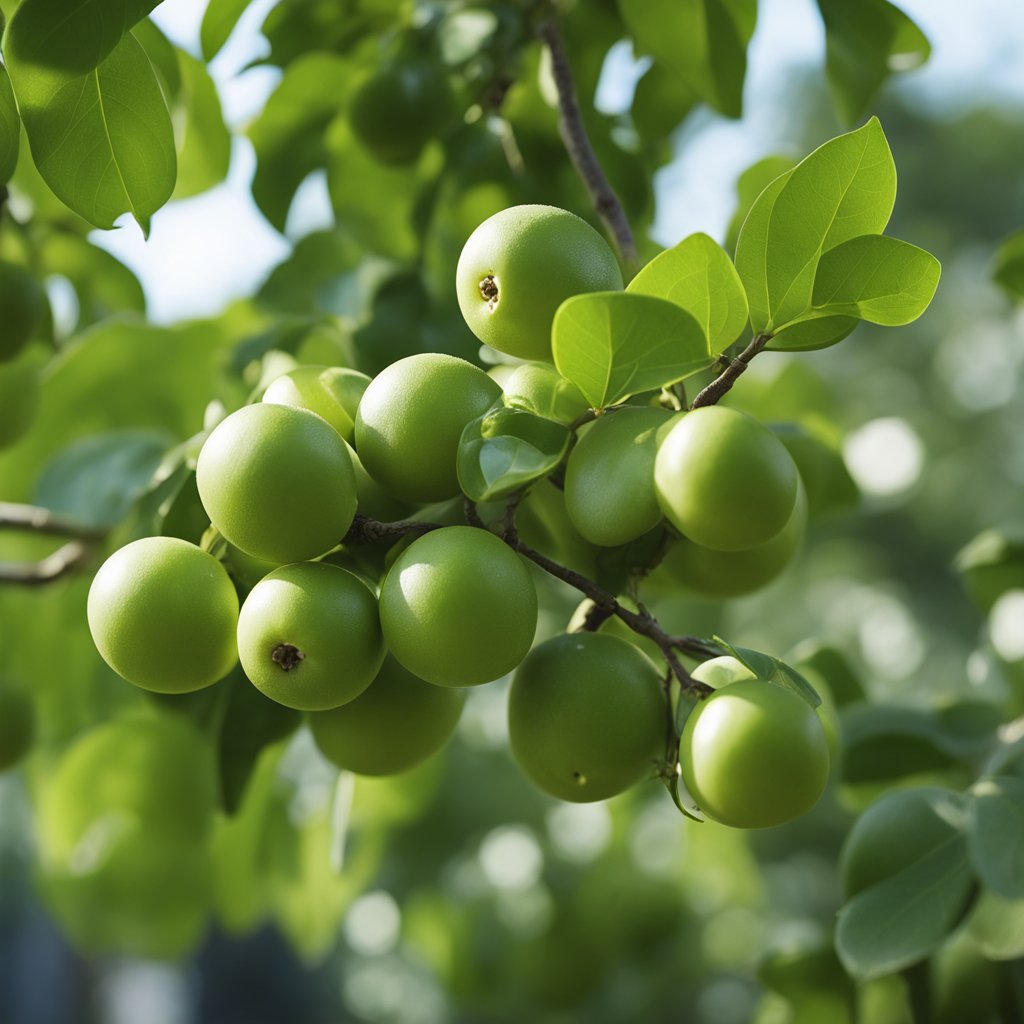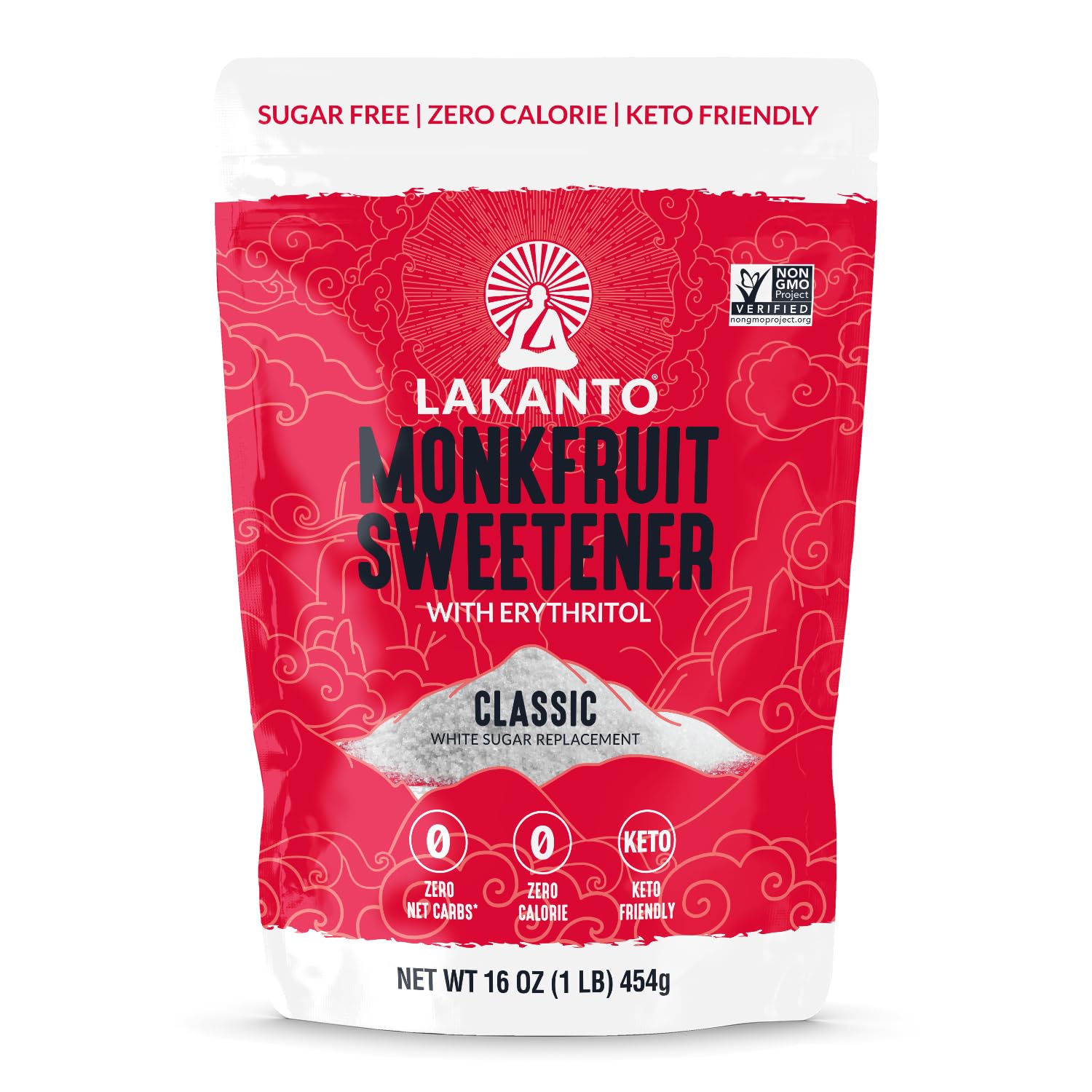Table of Contents
Will Monk Fruit Break Your Fast? Unveiling the Truth About Zero-Calorie Sweeteners
With an increasing number of people turning to artificial and natural sweeteners to satisfy their taste buds without adding calories, the question arises: will Monk Fruit break your fast if added to your beverages?
Intermittent fasting has become a popular method for many health enthusiasts aiming to improve overall health and manage weight. This dietary approach often involves cycles of eating and fasting, during which the consumption of caloric food and beverages is typically restricted.
Monk fruit, a zero-calorie sweetener, has gained attention as a suitable option for those looking to sweeten their drinks or food without interfering with their fasting state. With its natural origins and a sweetness profile significantly higher than sugar, it offers a beneficial alternative to synthetic sweeteners.
But the effects of these sugar substitutes on fasting is not just about the caloric content—understanding how they interact with your body’s response to fasting is crucial to maintaining the fast’s integrity.
Key Takeaways
- Monk fruit is a natural, zero-calorie sweetener that is used as an alternative to sugar during fasting periods.
- To maintain a fasting state, it’s important to consider how any sweetener might affect your body’s insulin response.
- When using sweeteners like monk fruit while fasting, it’s advisable to monitor your individual response and adjust consumption accordingly.
- Monk fruit extract contains antioxidants as its main components.
- Despite its sweet taste, it does not contain regular sugar that can cause blood sugar levels to spike.
Understanding Intermittent Fasting and Fasting States
Before we jump in, let’s clear up that intermittent fasting (IF) is all about meal timing—when you eat and when you don’t.
It’s crucial to know the drill since what you consume can impact your fasting state and the benefits that come with it.
The Basics of Intermittent Fasting
Intermittent fasting involves cycling between periods of eating and fasting.
During your fasting window, your body isn’t taking in energy through calories, which means it’s gotta tap into what it’s got stored. This is when things like fat loss and autophagy can kick into high gear.
- Popular IF plans include:
- 16/8 method (16 hours fasting, 8 hours eating)
- 5:2 approach (5 days of normal eating, 2 non-consecutive days of limited caloric intake)
- Eat-Stop-Eat (24-hour fast once or twice a week)
- Alternate day Fasting (fast for 16 hours or more every other day)
What Does It Mean to Break a Fast?
Breaking a fast is more than just grabbing a bite. It’s about what happens on the inside—specifically, an insulin response.
When you eat or drink something with calories, your body releases insulin to deal with the incoming energy. This switch flips your body out of fasting mode and boom—fast broken.
- Foods or drinks that trigger this response:
- Generally, anything with a significant amount of calories or sugar
Autophagy and Fat Loss Benefits
Here’s where IF gets super interesting.
Autophagy is your body’s way of spring cleaning, getting rid of damaged cells and regenerating new ones. Think of it like your body’s tune-up. This process is thought to be ramped up during fasting.
Fat loss happens because, with no outside energy, your body burns fat for fuel.
It’s like digging into your energy savings account. When done right, this can be a game changer for fat loss goals.
- Benefits may include:
- Improved body composition
- Enhanced cellular repair processes
By understanding these essentials of intermittent fasting and your fasting state, you’ll be way better equipped to navigate what does or doesn’t break a fast—like whether monk fruit sweetener affects your insulin when you’re trying to keep it clean.
What is Monk Fruit?

Monk fruit, also known as lo han guo, is a natural sweetener that has gained popularity due to its zero-calorie content.
Originating from Southeast Asia, this sweet fruit is celebrated for its intense sweetness without the typical sugar spike.
Monk Fruit Sweetener Explained
Monk fruit sweetener is derived from the juice of the monk fruit.
It gets its sweetness from unique antioxidants called mogrosides.
These compounds are processed out of the fresh fruit to create a powdered or liquid sweetener that’s free of glucose and fructose—that means it won’t spike your blood sugar.
What’s great about monk fruit sweetener is that it is classified as a natural sweetener, making it a favorable choice over synthetic options.
Comparing Mogrosides and Standard Sweeteners
Unlike common sweeteners that are packed with calories and can impact your glucose levels, mogrosides are different.
They’re metabolically unique in that they don’t break down to yield calories or sugar in your body.
As a result, monk fruit sweetener:
- Does not increase blood sugar levels
- Yields zero calories
In contrast, standard sweeteners like table sugar, high fructose corn syrup, and even some natural sweeteners, carry calories and can affect blood sugar and insulin levels.
This stark difference makes monk fruit a highly attractive sweetener for anyone monitoring their sugar intake or managing their weight.
Effects of Sweeteners on Fasting
When exploring the landscape of sweeteners available, it’s crucial to understand how they could affect your fast, particularly regarding insulin and blood sugar levels.
Impact of Sweeteners on Insulin and Blood Sugar
Artificial sweeteners and natural sweeteners alike can have varying impacts on your blood sugar levels.
While traditional sugar can cause a spike in blood sugar and subsequently insulin levels, some sugar substitutes might not have the same effect.
For instance, monk fruit sweetener is known for not causing a noticeable rise in insulin or blood sugar, making it a favorable option during fasting.
Understanding the Insulin Response
Your body’s insulin response is a key player in managing blood sugar levels.
Consuming foods or beverages that raise your insulin can potentially break your fast by signaling your body to switch from fasting to storage mode.
Some zero-calorie sweeteners may elicit an insulin secretion despite not contributing calories, which is why personal testing is recommended.
Zero-Calorie Sweeteners and Appetite
Even when some calorie free sweeteners don’t directly impact your insulin or blood sugar, they can still influence your appetite.
Ingredients like stevia, erythritol, and monk fruit are popular choices that are less likely to affect your hunger levels.
However, be wary of sugar alcohols, which can sometimes cause digestive discomfort or affect your appetite, depending on individual sensitivities.
Will Monk Fruit Break Your Fast?
When you’re fasting, keeping your blood sugar stable is key. You’re probably wondering if sweeteners like monk fruit will interrupt this delicate balance.
Analyzing Monk Fruit’s Impact on Fasting
Monk fruit, a natural sweetener, is favored by many for its zero-calorie sweetness, which doesn’t raise blood glucose levels significantly.
This is especially pertinent if you’re on a keto diet where maintaining a state of ketosis is vital.
Since it’s said to have a negligible effect on your insulin spike, consuming monk fruit might not technically break your fast.
But let’s be specific — not everyone reacts the same way to sweeteners, so it’s crucial to know how your body responds.
Blood Sugar Management with Monk Fruit
The glycemic index of monk fruit scores pretty low, which means it’s unlikely to mess with your blood sugar management.
This is good news if you’re concerned about maintaining stable blood glucose levels during your fasting periods or have insulin resistance.
When considering monk fruit as part of your fasting regimen, remember that it’s about individual response — for some, it’s a fasting-friendly sweetener, but for others, there might be some impact on insulin levels.
Additional Health Considerations
When you’re looking at monk fruit as a sweetener, it’s not just about whether it’ll break your fast. You’ve also got to think about how it might affect your body in the long run. Let’s check out some specifics.
Antioxidants and Anti-Inflammatory Properties
Monk fruit is pretty rad because it’s loaded with antioxidants that help fend off oxidative stress.
This could mean good news for keeping inflammation in check.
Since you’re interested in fasting, tapping into foods that fight inflammation could support your overall wellness game.
Monk Fruit for Diabetes and Weight Loss
If you’re juggling with blood sugar control or trying to shed some pounds, monk fruit might be a solid ally to curb insulin production.
Since it’s low in calories and doesn’t spike your insulin, it’s a good sweetener choice for weight loss plans and managing diabetes.
Just imagine, enjoying sweetness without messing up your metabolic health.
Potential Side Effects and Who Should Avoid It
Alright, so monk fruit is generally safe, but like all things, it’s not perfect for everyone.
If you’re pregnant or have a sensitive digestive system, you might want to go easy on it or have a chat with your doc.
It’s rare, but some folks could experience side effects or allergic reactions.
Monk fruit sweetener, approved by the FDA in 2010, has limited research on long-term effects and health benefits due to its intense sweetness, prompting some manufacturers to add other ingredients like sugar alcohols or fillers that may contain calories to their products.
Practical Tips for Using Monk Fruit in Fasting
When incorporating monk fruit into your fasting routine, it’s crucial to select products without hidden calories and integrate them in a way that won’t spike your insulin.
Choosing the Right Monk Fruit Products
Your primary goal is to avoid hidden sugars that could interrupt your fast.
Start by reading the label carefully; some monk fruit products may have fillers or additional sweeteners that can add unwanted carbohydrates.
Stick to 100% pure monk fruit sweetener. If the product includes any other ingredients, like sugar alcohols or fillers, it may not be a true zero-calorie option.
Integrating Monk Fruit into Your Fasting Routine
To safely use monk fruit as a sugar substitute during fasting periods, start small.
Since it’s significantly sweeter than sugar, a little goes a long way.
Adding a small amount to your tea or coffee can provide sweetness without calories, but remember, individual responses to sweeteners can vary.
If you’re doing a water-only fast for its potential benefits, you’ll want to avoid any sweeteners altogether. However, in fasting techniques where zero-calorie drinks are acceptable, monk fruit can be included without breaking your fast.
Beyond the Sweetener: Beverages and Foods During Fasting
Fasting-Safe Drinks: Coffee, Water, Diet Soda and Tea
Tea and coffee are your allies in fasting. They have virtually no calories and can boost your metabolism without breaking your fast. However, watch out for additives. Adding sugar, milk, or even a pat of butter to whip up that trendy keto coffee can introduce calories that break your fast.
- Plain black coffee: a go-to fast-safe option.
- Green or black tea: both are excellent calorie-free choices.
- Diet soda: is calorie-free and does not have any measurable effects on insulin.
- Choosing zero-calorie beverages: such as water or sparkling water is recommended.
Impact of Other Foods and Additives
When it comes to other foods and additives, the rule of thumb is to avoid anything with a significant calorie count. Remember, consuming calories, even in small amounts, can technically break your fast.
- Water: Always safe, keeps you hydrated, and is essential during fasting.
- Additives: Creamers, sweeteners, or flavorings can sneak in calories. Stick to zero-calorie options if you must have a hint of flavor.
Myths and Misconceptions
When it comes to fasting and the use of sweeteners like monk fruit, it’s easy to stumble upon conflicting advice. This section will help you separate fact from fiction.
Debunking Common Fasting and Sweetener Myths
- Myth: All Sweeteners Break Your Fast
Not all sweeteners are created equal. While some, especially those with calories, can break your fast, monk fruit sweetener is often considered safe. It contains zero calories and typically doesn’t elicit an insulin response that would interrupt your fasting state. - Myth: Sweeteners Always Increase Cravings
It’s commonly believed that all sweeteners, including non-caloric ones, can trigger sugar cravings or make them worse. However, this isn’t a universal truth. Each person responds differently, and natural sweeteners like monk fruit may not prompt cravings the same way that sugar or other sweeteners do. - Myth: Sugar Alcohols are Just Like Sugar
While sugar alcohols do resemble sugar in taste, they are not the same. Many sugar alcohols have a lower glycemic index, so they won’t spike your blood glucose levels. That said, read labels carefully—some monk fruit sweeteners are mixed with sugar alcohols that could potentially affect your fast. - Myth: A Sweet Taste Always Breaks a Fast
Although a sweet taste can sometimes signal the body to anticipate calories and thus potentially break a fast, this is not an absolute. For example, monk fruit sweetener might offer sweetness without disrupting the fasting process due to its lack of calories and less pronounced effect on insulin.
Remember to pay attention to how your own body responds to different sweeteners and consult your healthcare provider if you’re unsure about incorporating sweeteners into your fasting routine.
Conclusion: Finding Your Balance
When you’re exploring fasting, you’re probably stoked about the potential health benefits and the chance to boost your longevity. It’s like giving your body a bit of a tune-up, right? But when those hunger pangs hit, it can be super tempting to reach for something sweet. That’s where monk fruit swoops in as a possible life-saver during your fasting windows.
- Hunger Management: If you’re only fasting for gut rest or longevity, adding a splash of monk fruit might help you manage your hunger without derailing your efforts.
- Blood Sugar Levels: Monk fruit sweetener won’t spike your blood sugar or insulin, which is a huge win if you’re trying to maintain steady energy levels.
Take it easy, though. Sometimes, it’s worth giving those cravings the cold shoulder to see if they’ll pass. Plus, you’ll wanna keep an eye on any sweetener with extra ingredients that could sneak in calories. I hope this post answered your question: “Will monk fruit break your fast?”
Frequently Asked Questions
Making smart choices about what to consume during a fast can help maintain its benefits. Here’s what you should know about using monk fruit sweetener and other sweeteners while fasting.
Can I add monk fruit sweetener to my coffee if I’m fasting?
Yes, you can add monk fruit sweetener to your coffee while fasting as it contains zero calories and does not typically spike insulin levels.
How might monk fruit affect insulin levels during a fast?
While monk fruit sweetener does not usually cause an insulin spike in most individuals, it’s advisable to monitor your body’s response as it can vary from person to person.
Is there a particular sweetener that’s recommended for those who are fasting?
For those fasting, natural zero-calorie sweeteners like monk fruit, stevia, and allulose are generally recommended over artificial sweeteners.
Will using monk fruit take me out of ketosis while fasting?
Using monk fruit sweetener should not knock you out of ketosis as it has no carbs or sugars and does not cause an insulin response.
Are there any impacts on intermittent fasting when using erythritol as a sweetener?
Erythritol is another zero-calorie sweetener that is generally considered safe to use during intermittent fasting and should not impact the fasting process.
Does consuming dextrose have an effect on maintaining a fast?
Dextrose is a form of sugar. It will likely break your fast because it causes an insulin response and can interrupt the fasting state. It is best avoided if your goal is to maintain a fast.


